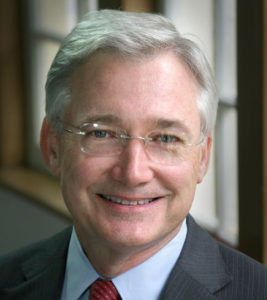On Inauguration Day evening, I went to bed exhausted with the mix of the day’s emotions. Joy over the beginning of a new administration; relief there had been no violence; and sorrow — sorrow over all the human lives lost to COVID-19 this year, sorrow over our riven nation with so much political acrimony and so many relationships sundered over political differences.
How shall we go forward? Two words came first to me: Justice and forbearance — justice in the public square and forbearance in the body of Christ. A civic virtue and a Christian virtue.

Stephen Shoemaker
Justice is pictured in America as a woman holding the scales of justice in her hand and her eyes blindfolded so that justice will be equal. As we know more and more, justice in America has not been blind to color, nor has it been administered equally to those with means and power and to those with meager means and power. The way forward must not turn away from the failures of the justice system. Nor can it turn away from the grievous misdeeds of people in power the last four years, including ex-President Trump, who has presided for these years as if the president were above the law.
Justice in the Bible has to do with fairness in the courts, the marketplace and the political realm. The Hebrew prophets were not shy about addressing the nation on such matters.
Two powerful images of justice were given us by Amos the prophet. The first was God dropping a plumbline from heaven to earth so that we could tell right from wrong again. “You have been crooked so long,” the prophet said, “you don’t know what straight is anymore!” The second image is of justice as a flowing river: “Let justice roll down like waters and righteousness like an ever-flowing stream.” When we damn up the waters of justice with our greed and structural injustice, the waters heap up dark and furious against the walls of the dam, break through, and God’s justice turns to judgment.
“We as a nation cannot move forward toward healing without the civic virtue of justice.”
Justice, then, was not just a set of laws, it was the justice-ing and righteous-ing power of God to replenish the world with fairness and equity, as the rivers of the earth replenish the earth. We as a nation cannot move forward toward healing without the civic virtue of justice.
But we also need another virtue, the Christian virtue of forbearance. James Calvin Davis pointed me here in his important book: Forbearance: A Theological Ethic for a Disagreeable Church. It was written in response to the church divisions growing out of the issue of homosexuality and the church. The virtue of forbearance offers urgent help for us today as church relationships have been strained and broken during our heightened political warfare. There has been so much hurt in the body of Christ. For the Apostle Paul, forbearance was one of the key virtues of the church to live in the unity of Christ. The word he used, anecho, means “to bear with” or “to hold up” another.
Paul wrote to the Ephesians: “I therefore, a prisoner of the Lord, beg you to lead a life worthy of the calling to which you have been called, with all humility and gentleness, with patience, bearing with one another in love, making every effort to maintain the unity of the Spirit in the bond of peace.”
“The virtue of forbearance offers urgent help for us today as church relationships have been strained and broken during our heightened political warfare.”
We bear with one another in our differences and in our weaknesses, especially when we believe one or another of us is in error. Bearing with one another, says Davis, means “carrying one another through difficult times.”
Dietrich Bonhoeffer in his beautiful book on the church, Life Together, wrote of the “ministry of bearing,” not just “bearing one another’s burdens,” but also bearing one another’s “freedom,” that is, our freedom to make mistakes, misjudgments and sin.
We practice this virtue because of and in the power of God’s forbearance of us. If we don’t think we need it, we are in real trouble! So let’s ponder how we can practice forbearance in the body of Christ as we have been bruised and bruised others. It has been made much worse because we have not been face-to-face with one another for almost a year. We have not broken bread together, talked with one another, worshiped with one another. When we begin to re-gather, a foot washing ceremony might be our first best sacrament, a sacrament of humility as the path torward forbearance.
In Abraham Lincoln’s first inaugural address, with the Civil War looming, he said: “We are not enemies, but friends. We must not be enemies. Though passion may have been strained, it must not break our bonds of affection.”
As we practice forbearance, we can, with God’s help, repair the bonds of affection.
Stephen Shoemaker serves as pastor of Grace Baptist Church in Statesville, N.C. He served previously as pastor of Myers Park Baptist in Charlotte, N.C.; Broadway Baptist in Fort Worth, Texas, and Crescent Hill Baptist in Louisville, Ky.


